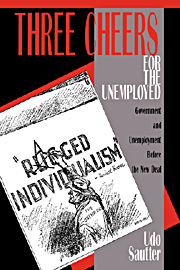"Sautter's book is extremely sensitive to developing labor and business ideologies, uncovering Hoover's reaction to the demands of relief, detecting the effects of business cycles, and showing the infuence of scientific management. In the end, it covers most of the period in considerable depth, and the thesis that most New Deal labor-market policy was developed in this era is clearly proven." Symposium
"This study contains an impressively detailed account of the history of the United States Employment Service. It also succeeds in locating and spelling out the links between the efforts of the Hoover administration and the ideas of well-known Progressive Era reformers; in so doing, it contributes to our understanding of the trajectory of unemployment reform from the early twentieth century to the New Deal." The Journal of American History
"Captive to the concerns and perspectives of the early twentieth century, reformers provided at best partial answers to the problem of unemployment. Sautter has written a comprehensive guide to their limited agenda. His work is essential to anyone who hopes to understand the intriguing relationship between unemployment and government in the twentieth century." American Historical Review
"Sautter's main goal is to trace reformers' attempts to get legislation enacted that would either lessen the likelihood of unemployment occurring or alleviate its impact...The book's contribution lies in the thoroughness of its research...The book represents the culmination of years of massive research...anyone desiring to research material on unemployment reform will need to consult this book." Reviews in American History
"Udo Sautter's new study therefore comes as a timely and welcome addition to an otherwise sparse literature." Times Higher Education Supplement
Sautter's book is extremely sensitive to developing labor and business ideologies, uncovering Hoover's reactions to the demands of relief, detecting the effects of business cycles, and showing the influence of scientific management. In the end, it covers most of the period in considerable depth, and the thesis that most New Deal labor-market policy was developed in this era is clearly proven." Thomas Janoski, Contemporary Sociology
"Udo Sautter's Three Cheers for the Unemployed, then, an impressively researched and very well written analysis fills an important gap in American History--and fills it very well indeed." American Journal of Sociology
"The historical research is impeccable and Three Cheers for the Unemployed is a distinguished study." Desmond King, Journal of Policy History



